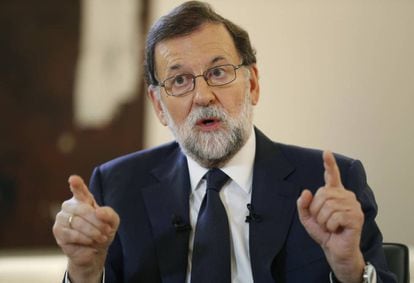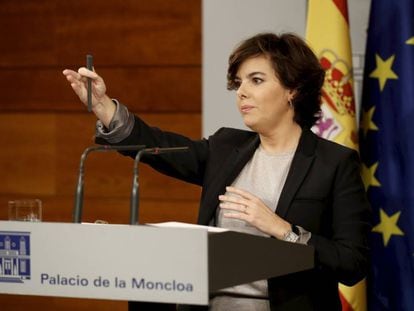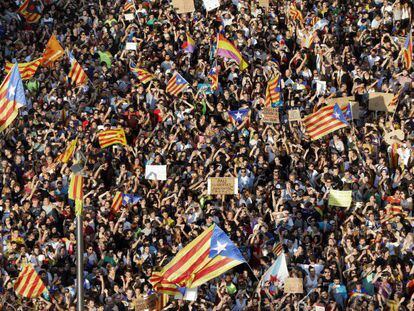An ironclad law
If leaders only work in their own interests, they will learn that bad governance leads to catastrophe

The serious political and social tensions gripping Catalonia right now shouldn’t obscure the one thing that can still give us hope: the fact that nothing irreparable has happened yet. Before the situation is allowed to deteriorate further, the leaders who have dragged us to this point, and who share different degrees of responsibility, need to answer the questions of people overwhelmed by an outlook we don’t want to face up to. Is the objective of those leaders to push forward without allowing anything irreversible to happen, or is it merely to be successful at imposing their agenda?
Since October 1, the only thing that's been at stake politically is the validity of the Constitution in the territory of Catalonia
If the answer is the latter, or in any way ambiguous or uncertain, then let’s admit it right now: there is no possible solution. In that case, we are not being represented by leaders willing to conform to what is possible, but by fanatics who fail to understand the costs of what’s improbable. By making citizens into partners of their scripted crusade, they in turn will become characters that history will remember, not for having bravely safeguarded freedom, but instead for having frivolously endangered our chance for coexistence.
The Catalan leaders who have developed the independence program within the institutions established by the Constitution of 1978, thinking they could be seen as what they aren’t by showing a little nerve or wit here and there, have settled into the mistaken position of portraying a noble image of their cause. Since they claim to speak in the name of Catalonia, in a certain light their proclaiming independence from Spain could seem like a democratic cause – except that, in addressing Spain in the name of Catalonia, they have ignored the will of Catalans who do not want independence, and there is nothing democratic about that will being ignored.
Obviously, Catalan leaders can claim that this was the reason for calling the referendum, and it was the central government that prevented it. But the fact that the central government prevented it still does not legitimize their use of public institutions as a means to further their own agenda, which is what they did when they decided to use a regional election as a plebiscite and when they legitimized those results in a local parliamentary session that once again completely ignored the will of Catalans who do not want independence. It’s even less justifiable to argue that the results of a partial referendum, called by and for the pro-independence alliance alone, is enough proof to jeopardize the future of Catalans, meaning all Catalans.
Their initiatives would never have prospered thus far had they met with something other than inaction from the central government
Their initiatives would never have prospered thus far had they met with something other than inaction from the central government, which they chose to interpret as resignation or indifference. This feckless attitude permitted them to advance not only in deeds, consolidating institutional positions that sooner rather than later will endanger civic peace in Catalonia and the rest of Spain, but has also reduced the chances of a strictly political response on behalf of those who reject independence. By not reacting politically within the Constitution, the central government, along with other parties that have have not been able to break the paralysis, are now forced to play politics with the Constitution, making it part of the program for Catalonia.
That’s why since October 1, the only thing that’s been at stake politically is the only thing that should never have been put into question in the first place: the validity of the Constitution in the territory of Catalonia. The pro-independence agenda wants to have it repealed once and for all by de facto means, and the central government is one step away from upholding it through another instrument, Article 155. This suspends the region’s autonomy and barely hides what is the state’s recourse of using legitimate force; legitimate, yes, but force nonetheless, a force that, when applied suspends the possibility of a solution until the return of political order.
These politicians will become characters that history will remember for having frivolously endangered our chance for coexistence
The crisis in Catalonia is generating widespread bewilderment and even a sense of intoxication that in some cases is expressed as euphoria while in others it is closer to dread. Intoxication is not an ideal state for decision-making, especially when these decisions seem predicated on looking for ways to prove how deeply rooted the will for Catalan independence is, or to prove the strength of the Spanish state. Because if something irreparable should occur in the squabbling, something irreparable in the same streets where people are marching today and where others will be marching tomorrow, the only thing it will prove yet again is that history’s ironclad law, the only ironclad law we know, has once again proven itself: that bad governance of institutions always comes before a catastrophe.
If, in response to the question we as citizens are addressing to our leaders, they are not willing to commit themselves fully to the conscious objective of avoiding a catastrophe while there is time, should they choose instead to win their cause at whatever cost, then what freedom of what nation or what triumph of what state could ever give us back everything that we’ll have lost?
Translation by Aurelio Major and Valerie Miles.













































